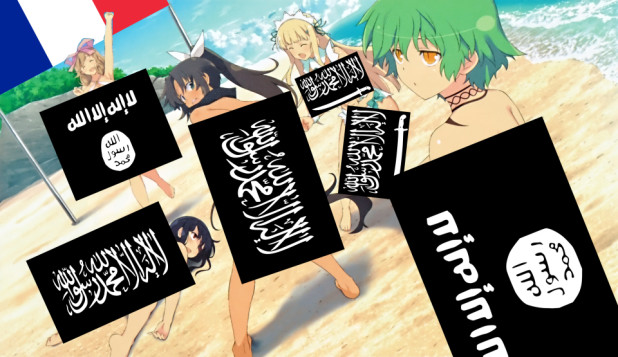Atlantic Centurion
September 3, 2016
During peacetime, ethnically diverse societies tend to fight over a variety of public cultural issues, such as flags, statuary, and holidays. They can’t help themselves. Multi-ethnic societies don’t think about issues from a clinically rational perspective that weighs the merits of arguments and considers the facts on the ground; they rely on tribal affiliation to determine political positions. The latest such issue to highlight this is the “burkini” controversy in France. The dispute, over what can only be described as Islamic swimwear, pits the ethnic French against Muslims and their anti-nationalist allies. This is what really matters, folks. Or does it? As controversial symbol of different things for different people, the burkini is an opportunity to fight.
This latest Islam-derived controversy comes in a country which has already banned face veils, and one that is reeling from several Islamic mass terror attacks over the last year and a half. The most recent attack was in July 2016, when 86 people died and 307 were injured in Nice. It was France’s deadliest kebab flare-up since the November 2015 Paris attacks, which killed 130 and injured 368. There was also the less major but no less extreme incident in July of a Catholic priest being martyred in Normandy, which the civil and religious authorities of France responded to with cucked mewling about tolerance and peace.
So just in time for last days of summer, more than a dozen French municipalities along the Mediterranean have banned the beach burqa, the so-called burkini. They cite numerous reasons, mostly referencing France’s state-enforced secularism or ideal of gender equality. Both of these are, for lack of a better word, threatened by the growing Muslim population, and the extremely concealing swimwear is a visible reminder of this. Islam, after all, is not an ecumenical ideology and has no room for respecting other ideologies unless they are subservient to it. In the aftermath of burkini-based beach brawls in Corsica between Europeans and North Africans, as well as the terrorism backdrop, public order has also become a pretext for the ban. So far, a French high court has struck down one of the bans.
The ban controversy has spread overseas and generated concern among the chattering classes in the Anglo countries, where the press tends to support “a woman’s right to choose” and “religious freedom.” Muh rights (created with European populations in mind), therefore Glad bag-clad Maghrebi women belong on French beaches. In an aggressive display of context denial, they also congratulate themselves on being clever enough to observe that the French want to regulate what women can wear in the name of opposing religious regulations on what women can wear. Checkmate, French bigots.
Now, I cannot precisely speak to what French-language coverage of the controversy is like, but I imagine there are more voices in support of the ban in France than there are internationally. An IFOP survey found two-thirds of French people polled were in favor. And this makes sense. Most Americans and Britcucks can go about their daily lives—unless they live in very specific areas—without physically experiencing the presence of Islam in their neighborhoods and workplaces. In other words, visible Islam is a non-issue to them; and so of course they side with the politically correct third-worldist opinion championed by the cosmopolitan elite. But France is at least 10% Muslim—the government doesn’t officially collect and release data on ethnicity and religion so precision is impossible—and most Muslims are concentrated in Paris and the South of France. A good amount of the ethnic French population then cannot avoid the physical presence of Islam.
So the question of whether Islam follows them to the beach, however mundane, has become swept up into the general French debate on Islam’s place in the Fifth Republic. The burkini becomes more than a swimsuit, it becomes a symbol of Islam, of terrorism, of diversity, of immigration, of tolerance, of the oppression of women, of feminism—of anything it can be fitted to.
And really, it is the mundaneness of the issue that makes it so striking. How did such a non-existential issue manage to seize the emotions of and elicit a righteous fervor from the left and right in France?
Judaeo-Saxon social psychologist (((Michael Billig))) wrote a book in 1995 called Banal Nationalism, which introduced a concept of the same name. Banal nationalism, as opposed to the more political or ideological forms of nationalism as a system, refers to everyday representations of “the nation” in the form of repetitive symbols, messages, and events. Examples (((Billig))) gives include flags, anthems, sports, and currency. From the book’s introduction:
“The central thesis of the present book is that, in the established nations, there is a continual ‘flagging’, or reminding, of nationhood… France, the USA, the United Kingdom or New Zealand – are not typically termed ‘nationalists’. However, as will be suggested, nationhood provides a continual background for their political discourses, for cultural products, and even for the structuring of newspapers. In so many little ways, the citizenry are daily reminded of their national place in a world of nations. However, this reminding is so familiar, so continual, that it is not consciously registered as reminding. The metonymic image of banal nationalism is not a flag which is being consciously waved with fervent passion; it is the flag hanging unnoticed on the public building.”
Like the Stars and Stripes hanging from house after house in the American suburb, the burqas, niqabs, hijabs, and Glad bags draped over Afro-Islamic women in the French banlieue are banal. They’re just there. They don’t really mean anything by themselves. They are symbols of something much bigger that people can connect with emotionally and ideologically. The burkini, the beach ready shariah-compliant swimwear, is just an extension of something already ubiquitous in France, Islam.
That’s one way of looking at it, though a bit of a stretch. The established fact of Islamic dress being visible in France, now extended to yet another category of clothing, is not something as settled as the design and display of the flag. It is not a banal symbol of the nation. It is a banal symbol of a contentious process taking place in France, their own third demographic transition.
The burkini debate sprawls its tentacles out like an octopus, attaching to secondary issues like secularism, religion, terrorism, feminism, egalitarianism, and tolerance. But what the burkini itself actually represents—and what the debate should be centered on—is that France is less French every year as a result of the Fifth Republic’s immigration policies. There would be no burkini if France wasn’t over 10% kebab and counting. A third of babies born in France are non-European, so this is not going to go away. The debate should be about Françafrique, not fashion. With the rise of the nativist, civic nationalist party Front National in the polls, France is approaching this debate, which must take place and will not be resolved without pain.
But this is essay is titled “Banal Ethnic Conflict,” not “Ethnic Conflict.” We’re talking about ethno-identitarian disputes over mundane symbols, not armed struggle. The ethnic conflict in France, for now, is cold rather than hot. It’s about swimwear. It’s completely banal. And yet, the underlying issue is so brutally obvious that the efforts to ignore it and make the issue one of fashion and feminism are deeply suspect. Superficially, there is a debate about secularism and women’s rights centered on the banal issue of clothing. What remains unspoken by much of the press, however, is the demographic reality. A principled debate about the merits of secularism in French society this is not. It’s about France itself, but as a multi-ethnic country, France can’t truly have that discussion because all politics is tribal.
The burkini controversy is a banal ethnic conflict between Frank and Saracen. The French don’t want it to be obvious anywhere they go in public that their country is crawling with Maghrebis. They want to go to the beach—they want to take a break from life’s drudgery—without experiencing the third world. Support for the ban is opposition to demographic change expressed through the only politically correct form available, that of defending secularism. The Maghrebi population on the other hand, wants to enforce its ancestral customs and norms rather than adopt those of the France, which are seen as both immoral and soft.
If the French government forces Islamic dress out of the public space, it won’t change the deep-seated attachment to Islam that Maghrebi colonists have, or make them into Europeans. It will reduce the visibility of Islam, not Islam itself. It won’t change fertility rates. Banning the burkini is not some silver bullet that will solve the “assimilation” problem in France. Multi-ethnic football teams didn’t do it, and this won’t either. Nothing will, because you cannot assimilate millions of ethnocentric foreigners of a different nation and religious tradition into a community which prides itself on believing in nothing.
So it’s a banal ethnic conflict in another sense, in that no matter which tribe wins this fight it will not alter the balance of power. It’s just another thing to fight over because diversity + proximity = conflict.
If France continues its biological drift towards Africa and ideological drift towards Islamic socialism, the coming debate will not be over banning the burkini. It will be over mandating the burkini. And at that point, Islamic dress will be as banal in “France” as the Tricolor.
 Daily Stormer The Most Censored Publication in History
Daily Stormer The Most Censored Publication in History



